Accelerate > Publications
Search this online library featuring the latest FAO publications, issue papers and briefs which offer up-to-date knowledge and innovative insights for SDG acceleration.
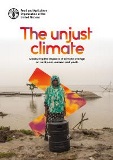
The unjust climate: Measuring the impacts of climate change on rural poor, women and youth
2024
This report assembles an impressive set of data from 24 low- and middle-income countries in five world regions to measure the effects of climate change on rural women, youths and people living in poverty. It analyses socioeconomic data collected from 109 341 rural households (representing over 950 million rural people) in these 24 countries. These data are combined in both space and time with 70 years of georeferenced data on daily precipitation and temperatures.
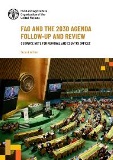
FAO and the 2030 Agenda Follow-up and Review: Guidance Note for Regional and Country Offices
2023
The Guidance Note describes the process of the preparation of the VNRs and what FAO Regional and Country Offices need to be aware and mindful of when providing support to the national partners. It covers information about the importance of the follow-up and review process for the 2030 Agenda and the SDGs, including information about the gaps in the coverage of the Voluntary National Reviews, and recommendations on strengthening VNRs to be meaningful instruments for the acceleration of the SDGs.
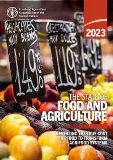
The State of Food and Agriculture 2023 - Revealing the true cost of food to transform agrifood systems
2023
The State of Food and Agriculture 2023 looks into the true cost of food for sustainable agrifood systems. The report introduces the concept of hidden environmental, health and social costs and benefits of agrifood systems and proposes an approach – true cost accounting (TCA) – to assess them.
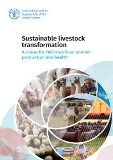
Sustainable livestock transformation. A vision for FAO’s work on animal production and health
2023
Within the framework of the United Nations 2030 Agenda for Sustainable Development, FAO assists Member Nations to improve sound policies, increase investments and develop good practices in the livestock sector.
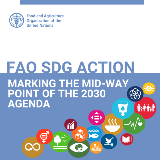
FAO SDG Action: Marking the mid-way point of the 2030 Agenda
2023
As we stand at the midpoint of the 2030 Agenda, it is both a moment of reflection and an opportunity to renew our commitment to achieving the SDGs. In August 2023, the FAO Office of SDGs launched a survey, receiving over 600 responses that shared valuable insights, experiences and actions taken by FAO offices towards the achievement of the SDGs. In addition this survey, FAO project data was leveraged to present this visual representation of FAO’s contribution to the 2030 Agenda implementation.
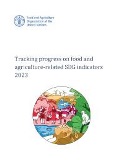
Tracking progress on food and agriculture-related SDG indicators 2023
2023
At the mid-point of the Agenda 2030 for Sustainable Development, there is an urgent need to understand where the world stands in eliminating hunger and food insecurity, as well as in ensuring sustainable agriculture. The new report of the Food and Agriculture Organization of the United Nations (FAO),offers analysis and trends on indicators across eight Sustainable Development Goals (SDGs) – in particular, SDGs 1, 2, 5, 6, 10, 12, 14 and 15.
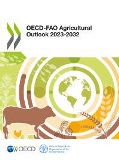
OECD-FAO Agricultural Outlook 2023-2032
2023
The Agricultural Outlook 2023-2032 is a collaborative effort of the Organisation for Economic Co-operation and Development (OECD) and the Food and Agriculture Organization of the United Nations (FAO). It brings together the commodity, policy and country expertise of both organisations as well as input from collaborating member countries to provide an annual assessment of the prospects for the coming decade of national, regional and global agricultural commodity markets.
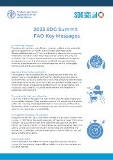
2023 SDG Summit: FAO Key Messages
2023
The 2023 SDG Summit will serve as a pivotal event towards achieving the SDGs, as gathered Heads of State and Government are to carry out a comprehensive review of progress, respond to the impact of multiple crises, and provide high-level political guidance on transformative and accelerated actions for achieving the 2030 Agenda. FAO has developed these key messages to inform the discussions in the lead up to and during this Summit and the Political Declaration which will result from them.
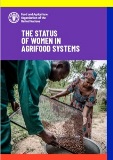
The status of women in agrifood systems
2023
This new FAO report provides a comprehensive picture of the status of women not only in agriculture, but across agrifood systems. It presents extensive data and lessons learned about gender in agrifood systems, with particular focus on how women participate in and benefit from socio-economic opportunities.

Transforming public agricultural extension and advisory service systems in smallholder farming - Status quo, gaps, way forward
2022
Worldwide, extension and advisory service (EAS) systems have undergone reforms since the 1990s. However, the reforms of the last two decades in many countries have largely failed, as there has not been significant increase in accountability, efficiency, empowerment or impact. To fill this gap, this document, based on a systematic and extended literature review, delves into public EAS systems in developing countries, with a special focus on smallholder farming and institutional reforms.
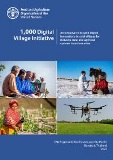
1,000 Digital Village Initiative - An initiative to expand digital innovations in rural villages for inclusive rural and agrifood systems transformation
2022
This report introduces the FAO Digital Village Initiative, which aims to facilitate through knowledge and information. It approaches countries and communities to develop, accelerate and deploy digital technologies in rural villages and communities. The report introduces the Digital Village Ecosystem approach. It describes an instrument (tool) to gather information and provide a village ecosystem assessment to help generate recommendations for future interventions to deploy beneficial, ...

Labelling and certification schemes for Indigenous Peoples' foods
2022
This review, for the first time to date, analyses the potential of labelling and certification schemes for Indigenous Peoples to market their food products. Specifically, it looks at those schemes that are designed by, with and for Indigenous Peoples, and that can provide economic, social and environmental benefits while protecting and promoting their unique values centered around the respect of life and Mother Earth.
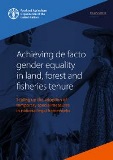
Achieving de facto gender equality in land, forest and fisheries tenure - Scaling up the adoption of temporary special measures in national legal frameworks
2022
This legal paper first considers the obligations of states in relation to gender equality and the adoption of temporary special measures, and the work of the Convention on the Elimination of All Forms of Discrimination Against Women (CEDAW) Committee in clarifying and expanding the concept of temporary special measures.

South-South in Action - South-South and triangular cooperation in agricultural development: FAO's experiences
2022
This publication outlines key features of South-South and Triangular Cooperation (SSTC) and how FAO has applied SSTC to the delivery of its mission. The case studies presented provide a window on how SSTC has contributed to alleviating hunger and malnutrition in countries across the global South and has helped build resilience in the face of climate change and other development challenges.
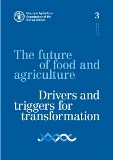
The future of food and agriculture – Drivers and triggers for transformation
2022
This report aims at inspiring strategic thinking and actions to transform agrifood systems towards a sustainable, resilient and inclusive future, by building on both previous reports in the same series as well as on a comprehensive corporate strategic foresight exercise that also nurtured FAO Strategic Framework 2022–31. It analyses major drivers of agrifood systems and explores how their trends could determine alternative futures of agrifood, socioeconomic and environmental systems.
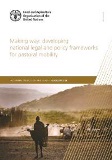
Making way - developing national legal and policy frameworks for pastoral mobility
2022
This handbook calls for the legal recognition and securing of pastoral mobility as a way of safeguarding and facilitating a continuous stream of economic and social benefits for pastoralists, countries, and the environment. It facilitates a deeper understanding of pastoral mobility through examples and case studies drawn from various parts of the world and identifies considerations to be borne in mind when legislating for mobility.
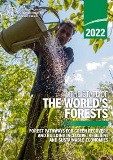
The State of the World’s Forests 2022 - Forest pathways for green recovery and building inclusive, resilient and sustainable economies
2022
Against the backdrop of the Glasgow Leaders’ Declaration on Forests and Land Use and the pledge of 140 countries to eliminate forest loss by 2030 and to support restoration and sustainable forestry, the 2022 edition of The State of the World’s Forests (SOFO) explores the potential of three forest pathways for achieving green recovery and tackling multidimensional planetary crises, including climate change and biodiversity loss...
Tracking progress on food and agriculture-related SDG indicators 2022
2022
Seven years into the 2030 Agenda, there is an urgent need to understand where the world stands in eliminating hunger and food insecurity, as well as in ensuring sustainable agriculture. FAO’s new report, “Tracking progress on food and agriculture-related SDG indicators”, offers analysis and trends on indicators across eight SDGs (1, 2, 5, 6, 10, 12, 14 and 15), highlighting areas of progress and areas where further effort is needed.
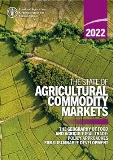
The State of Agricultural Commodity Markets 2022 - The geography of food and agricultural trade: Policy approaches for sustainable development
2022
This edition of The State of Agricultural Commodity Markets (SOCO) discusses how trade policies, based on both multilateral and regional approaches, can address today’s challenges for sustainable development. Trade policies in food and agriculture should aim to safeguard global food security, address the trade-offs between economic and environmental objectives, and strengthen the resilience of the global agrifood system to shocks, such as conflicts, pandemics and extreme weather.
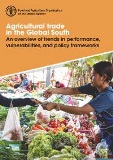
Agricultural trade in the Global South - An overview of trends in performance, vulnerabilities, and policy frameworks
2022
South-South Cooperation (SSC) is increasingly recognized as an effective instrument for catalyzing economic development by fostering the exchange of innovation and good practices, and expanding market opportunities across countries with a similar level of development and shared development objectives, such as those reflected in the Sustainable Development Goals (SDGs).
Browse by SDG
- SDG1: No Poverty
- SDG2: Zero Hunger
- SDG3: Good Health & Well-being
- SDG4: Quality Education
- SDG5: Gender Equality
- SDG6: Clean Water & Sanitation
- SDG7: Affordable and Clean Energy
- SDG8: Decent Work and Economic Growth
- SDG9: Industry, Innovation and Infrastructure
- SDG10: Reduced Inequalities
- SDG11: Sustainable Cities and Communities
- SDG12: Responsible Consumption and Production
- SDG13: Climate Action
- SDG14: Life Below Water
- SDG15: Life on Land
- SDG16: Peace, Justice and Strong Institutions
- SDG17: Partnerships for the Goals
Browse by Better
Browse by Priority Area
- Innovation for Sustainable Agriculture Production
- Blue Transformation
- One Health
- Small-Scale Producers' Equitable Access to Resources
- Digital Agriculture
- Healthy Diets for All
- Nutrition for the Most Vulnerable
- Safe Food for Everyone
- Reducing Food Loss and Waste
- Transparent Markets and Trade
- Climate Change Mitigating and Adapted Agrifood Systems
- Bioeconomy for Sustainable Food and Agriculture
- Biodiversity and Ecosystem Services for Food and Agriculture
- Achieving Sustainable Urban Food Systems
- Gender Equality and Rural Women's Empowerment
- Inclusive Rural Transformation
- Agriculture and Food Emergencies
- Resilient Agrifood Systems
- Hand-in-Hand Initiative
- Scaling up Investment
